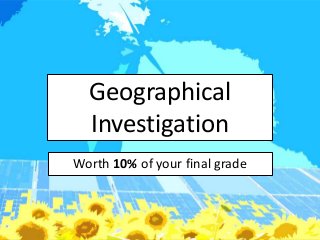
Geographical investigation intro
- 1. Geographical Investigation Worth 10% of your final grade
- 4. How will I present my work? • You will be creating a 5 minute (NO LONGER) oral presentation. • You should have a PowerPoint to go with your presentation. • You may have notes with you, but no fully detailed scripts allowed. • You will be recorded.
- 5. Who will I present my work to? • You will be presenting your speeches in front of either Miss Hamer or Mr Brodhurst. • They will record you. • There will be no other person in the room. • You will have an allotted appointment time, which you must attend.
- 6. When?
- 7. What to expect from us • Guidance about structuring your presentation and how to get started. • Provision of certain case study material you can include. • Help understanding the mark scheme. • ICT support
- 8. What we expect from you • Productive use of all lessons. • Part of your homework time devoted to your presentation and research. • Responsibility for your own work load. • A presentation that is worth 10% of your final grade, that justifies 6 hours of lessons and homework time.
- 9. Mark Scheme
- 10. How has Solar energy developed across the world?
- 11. Location/Background • What is solar energy? • Are there different types? • How does it work? • Where was it invented and by who? • Is it expensive? What does it cost? • Why was it invented? Why is it needed? What’s its purpose?
- 12. Analysis/Investigative • Which countries use it? • How have they used it? • Which countries have not used it? • Why have they not used it? • How has it helped/hindered people? Advantages? • How has it helped/hindered the environment? Disadvantages?
- 13. Evaluation/effects • What do different stakeholders feel about solar energy? Why? • Where is it most successful/unsuccessful? Why? • Is solar energy sustainable? • Are there negatives of solar energy?
- 14. Conclusion • What are my views on solar energy? • What will the future be like for solar energy? OR What will the future be like without it? • What conclusion have a I made?
- 15. How you structure your presentation • I suggest that you follow the vague outline on the planning grid. • You should try to address the enquiry questions in the relevant places.
- 16. How you structure your presentation • You can answer some questions within a particular case study: • Where has it been successful, why? • How has it helped people/environment? • What do stakeholders think about it?
- 17. How will I choose my case studies? • We will certainly provide you with some solar energy real examples. • You should aim to include at least 2 case studies and no more than 4 (you only have 5 minutes!) • They should compliment each other and help you address your questions – small vs. large scale/top down vs. bottom up/high cost vs. low cost.
- 18. Converted to Can be used to heat:
- 19. Solar power is the conversion of sunlight into electricity. Concentrated solar power systems Uses lenses or mirrors and tracking systems to focus a large area of sunlight into a small beam.
- 20. Photovoltaic Systems Photovoltaics are best known as a method for generating electric power by using solar cells to convert energy from the sun into a flow of electrons.
Notas del editor
- WRITE IN PLANNERS!
- Brainstorm some questions that you could ask about this topic
- Water – homes, buildings, swimming poolsSpaces: homes, greenhouses, officesFluid to turn turbines to generate electricity
- Water – homes, buildings, swimming poolsSpaces: homes, greenhouses, officesFluid to turn turbines to generate electricity